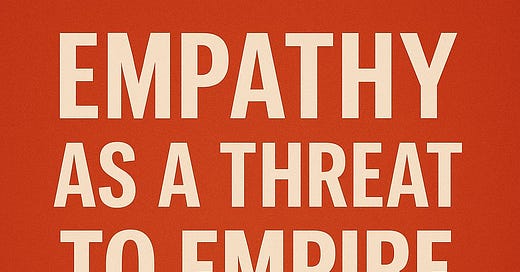Return to the Emotional Heresy Series Hub
Why Oppressive Systems Must Suppress Compassion to Survive
A word to the reader:
Empathy is not soft.
It is not weakness.
It is not naïve.
In a world built on hierarchy, punishment, and control, empathy is a threat.
Because once you allow yourself to feel—really feel—the pain of the oppressed, the abandoned, the criminalized, the cast out—
You can’t unsee it.
You can’t explain it away with doctrine.
You can’t pretend the system works just fine.
Empathy is disruptive.
Because it humanizes the people power needs us to fear.
Jesus Didn’t Just Love. He Disobeyed.
They don't crucify you for being nice.
They crucify you for being dangerous to the order of things.
Jesus was not killed for preaching private salvation.
He was killed for touching lepers.
For healing on the Sabbath.
For forgiving without permission.
For sitting with the wrong people.
For weeping over the very city that would execute him.
Every act of compassion was an act of resistance.
He violated purity codes.
He defied religious law.
He showed mercy where punishment was demanded.
Empathy wasn’t his side trait—it was his strategy.
And in that empire, empathy was heresy.
Because it saw through the system.
Because it stopped for the bleeding woman.
Because it made space at the table for the excluded.
Because it refused to play the game of worthiness.
Why Oppressive Systems Can’t Afford Empathy
Authoritarianism needs emotional distance.
It needs you to dehumanize someone in order to control them.
That’s why:
Refugees must be called invaders
The poor must be called lazy
The criminalized must be called evil
Protestors must be called threats
Survivors must be called liars
The sick must be called burdens
It doesn’t matter whether the system is political, religious, economic, or cultural.
If it depends on hierarchy and obedience, it must cut off empathy at the root.
Because empathy humanizes.
And you can’t harm what you’ve humanized without tearing yourself apart.
How Empathy Was Reframed as Weakness
They couldn’t destroy empathy outright.
So they rebranded it.
They called it:
“Bleeding heart”
“Overly emotional”
“Soft”
“Naïve”
“Unbiblical”
“Feminine”
“Liberal”
“Dangerous to national security”
They taught us to flinch when we felt too much.
To apologize for crying.
To suppress our instinct to help unless it came with moral conditions.
Even inside the church, compassion became conditional:
Help the poor—but only the grateful kind.
Forgive the sinner—but only if they repent on your terms.
Love your neighbor—but only the ones who agree with you.
Empathy was reshaped into sentimentality—something for children and the weak.
It became emotional excess, not moral clarity.
But here’s the truth they hoped we’d forget:
Empathy isn’t the opposite of strength. It’s what keeps strength from becoming cruelty.
IV. Empathy Is a Form of Power—And It Scares Them
Empathy awakens the nervous system.
It bypasses indoctrination and touches the heart.
It activates moral imagination—the ability to say “this could be me” or “I refuse to accept this for anyone.”
That’s what makes empathy dangerous:
You can’t unfeel a mother’s grief after watching her son murdered by police.
You can’t unsee the fatigue in a refugee’s eyes.
You can’t unhear the crack in a survivor’s voice when no one believes her.
Empathy makes injustice feel personal.
And the moment injustice becomes personal, the empire starts to crumble.
Because now you’re not just a subject.
You’re a witness.
Empathy doesn’t just make us feel.
It compels us to act.
It says: This pain belongs to all of us now.
And there’s nothing an oppressive system fears more than collective moral awakening.
V. Reclaiming Empathy as Resistance
Empathy is not about being “nice.”
It’s about refusing to dehumanize.
It’s about saying:
I will not look away.
I will not numb myself just to function.
I will not abandon the wounded to feel more comfortable in my theology, my politics, or my skin.
Empathy is a daily choice to remain porous in a world that rewards walls.
It says:
“I see your pain, and I will not explain it away. I will not use your struggle to make myself feel superior. I will not call your oppression justified.”
And when that empathy turns into boundaries, advocacy, solidarity, or protest—it becomes resistance.
Not performative.
Not decorative.
Sacred. Defiant. Unyielding.
VI. A Question for Reflection
Where have you been told that empathy makes you soft?
What if that softness is exactly what makes you uncontrollable?What empire—internal or external—crumbles the moment you stop numbing and start feeling again?




